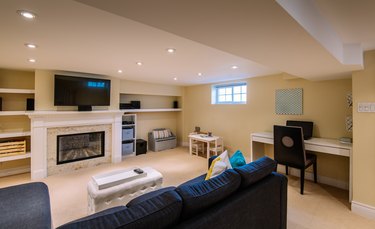
Whether you own a home with a basement apartment or you're a renter, figuring out how to dehumidify a basement apartment is often a challenge. Not only does it make your apartment more comfortable, but it also protects your furniture and belongings. Moisture can come from external sources or from internal activities. Identifying what's causing the basement humidity problem can help you effectively correct it.
Why Dehumidifying Is Important
Video of the Day
Excess humidity is common in the lower level of a building. It makes everything feel a little damp, and it can create a musty smell as things get damp. Mold and mildew can also grow if you don't dehumidify a basement apartment properly. Ideal home humidity levels range from 30 to 50 percent. Once it passes 50 percent, the humidity can cause dampness, mold, mildew and condensation on things like windows and toilet tanks.
Video of the Day
Block Outside Moisture
Moisture from outside your basement apartment can seep inside through gaps and cracks. Look for gaps and cracks on the walls and around windows in your basement. Sealing those issues can decrease how much moisture gets into your apartment. Using window caulk can help you close small gaps around your windows.
Adding basement insulation in the apartment can also help minimize moisture problems. Insulation minimizes heat transfer, which can cause water vapor to enter your space. Properly sealing and insulating helps your basement apartment maintain a more consistent temperature and can help reduce humidity.
Sometimes, grading issues outside the basement apartment can contribute to moisture. The ground needs to slope away from the house to help water flow away from your basement apartment walls. Properly functioning gutters and downspouts with downspout extensions also help move water away from the basement apartment walls to keep it dry. You might need to install a more extensive drainage system inside or outside the apartment to pull excess moisture away from the space.
Use a Dehumidifier
Dehumidifiers are convenient options for reducing humidity in your basement apartment. They're portable and easy to use. You can also get a whole-house dehumidifier, either freestanding or connected to the ductwork, for more widespread moisture control. A dehumidifier pulls moisture out of the air and turns it into water droplets that you can dump.
You can also use a moisture absorber product without dealing with plugging in or emptying a dehumidifier. The moisture-absorbing crystals often come in a spill-proof container that you can place in areas known for moisture problems. Once they reach their absorption capacity, toss them and replace them with fresh crystals.
Increase the Heat
Lower temperatures can increase how much humidity collects in your basement apartment. Relative humidity increases with cooler temperatures. Dehumidifiers also work better at higher temperatures. Bumping up your thermostat might help clear up some of the humidity issues. Keep the thermostat at a consistently warm temperature, as fluctuations between cold and warm temperatures can increase moisture accumulation.
Cut Down on Moisture Creation
Many everyday activities you do inside your basement apartment generate more moisture, which adds to the humidity problem. Showering and cooking are two common examples, but using a gas fireplace also creates water vapor in your apartment. Vented fireplaces can dehumidify the air to keep your space drier. A clothes dryer that's not vented can also add moisture to your space.
Limiting those activities can cut down on overall humidity. Exhaust fans in your basement apartment bathroom and kitchen can help pull out some of the moisture. Run the fans before and after those activities to give it time to dry out.
During warmer weather, you can also open your basement windows to help reduce humidity. The ventilation can help release some of the moisture inside the apartment. It also lets in fresh air to help let out musty basement smells that sometimes happen.